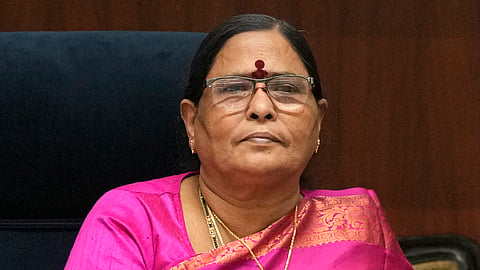Addressing the NHRC's anniversary, Chairperson highlights human rights violations at Sandeshkhali
During the 31st anniversary celebration of the National Human Rights Commission (NHRC) at Vigyan Bhawan, Acting Chairperson Vijaya Bharathi Sayani brought attention to the troubling case of alleged sexual harassment against women in Sandeshkhali, West Bengal. She recalled the strong language used by the NHRC in its critical report following an on-the-ground inquiry into the matter.
Sayani spoke in front of Vice President Jagdeep Dhankhar, who was the chief guest at the event. She noted that the NHRC has addressed a wide range of human rights violations, including custodial deaths, bonded labor, exploitation of marginalized groups, and denial of medical care. Focusing on the Sandeshkhali case, Sayani detailed the NHRC's inquiry findings published in April of this year. “The NHRC responded to serious reports of harassment and sexual assaults against women in Sandeshkhali,” she stated. “An on-site inquiry conducted by NHRC members revealed a climate of fear and intimidation that prevented victims from seeking justice.”
The Sandeshkhali incident gained political traction earlier this year, particularly due to allegations against a leader associated with the ruling Trinamool Congress in West Bengal. The NHRC's widely reported findings highlighted that the “atmosphere created by the alleged perpetrators silenced the victims,” and the intimidation they faced made them “reluctant to seek justice.”
The report characterized this “climate of terror” as one that perpetuates a cycle of abuse, underscoring the urgent need for a safe environment that encourages victims to break their silence. As the political landscape shifts with the upcoming 2024 Lok Sabha elections, the ongoing conflict between the Trinamool Congress and the Bharatiya Janata Party (BJP) surrounding this case has taken center stage.
In a recent statement, the NHRC revealed that from its inception on October 12, 1993, until September 30, 2024, it had handled 2,305,194 cases, including 2,873 cases taken up suo motu. The commission also recommended monetary relief totaling over Rs 254 crore in 8,731 cases. Between October 1, 2023, and September 30, 2024, the NHRC disposed of 68,867 cases, suggesting a commitment to justice with recommendations for over Rs 17.88 crore in monetary relief for rights violations in 404 cases.
Sayani highlighted these figures, stating that resolving over 68,000 complaints illustrates the NHRC's dedication to justice. In her address, she emphasized that human rights are foundational to a just society, ensuring dignity, freedom, and well-being for all while empowering marginalized communities. She asserted that India's advancement as a nation is intrinsically linked to its commitment to human rights, a principle deeply rooted in the nation's civilization and constitution. "As a home to one-sixth of humanity, India is becoming a global role model in promoting individual dignity and freedom," she said.
Sayani celebrated India's rich cultural diversity, stating, "Respect for individual dignity is central to the Indian ethos, deeply embedded in our ancient texts such as the Vedas and the Gita." Over the past year, the NHRC conducted independent inquiries into 30 cases of human rights violations while addressing various complaints.
Recalling the NHRC's early years, Sayani noted that it received only 496 complaints during its inception in 1993-94. She concluded her address by reiterating the NHRC's commitment to uplifting vulnerable groups and prioritizing their human rights with compassion. “Our strength lies in our unity in diversity, guided by the 'Manav Dharma,' placing humanity at the core of our mission. The NHRC envisions a society where the dignity and rights of every individual are respected, fostering inclusivity and understanding,” Sayani added.
.png)


